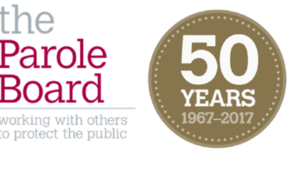Parole Board information for Victims
Information on how Victims can engage in the parole process

50th anniversary
A victim can be kept informed of a prisoner’s progress by signing up to the victim contact service. This is a service that the National Probation Service provide and a victim will be offered the option to sign up when the crime took place, although a victim can sign up at any time.
There is only limited information that can be disclosed but this includes if the prisoner is due a parole review. A victim would not necessarily be told which prison the prisoner is held in, unless they opt to ask to attend a parole hearing in person.
Once a victim is aware that a parole review is taking place, they can decide whether to submit a Victim Personal Statement (VPS). This statement will go into the evidence presented to the Parole Board and the victim will have the option to attend the oral hearing in person, if there is to be one, to read out their statement. Not all cases are heard at oral hearing and many are concluded on the papers where a VPS will be considered and seen by the Parole Board panel.
The victim personal statement is about the impact the crime had on the victim at the time and continues to have in the present day. A victim can ask for certain conditions to be set, should the offender be released, for example to include an exclusion zone of where the victim lives. A statement should not include anything that relates to risk, but if a victim does have information that relates to how risky a prisoner is, then that information should be passed on to the probation service and they will consider including it in their report.
The VPS does not directly link to the decision. This is because the Parole Board’s focus is risk assessment which is not the focus of the VPS. If risk information is contained in the VPS it would have been dealt with as a separate matter. The VPS does allow the panel to direct questions to the prisoner regarding impact of their behaviour, insight into their behaviour, remorse, empathy and assessing licence conditions. It gives the panel insight into the original offence and the impact of those affected. It also helps the panel decide appropriate licence conditions, if the prisoner is to be released.
Writing a victim personal statement can be a traumatic experience and victims will be helped through this by a Victim Liaison Officer. The Parole Board has produced a booklet to assist victims in understanding how parole works, which is available here.
For information on Indeterminate Sentence Prisoners, use this link.